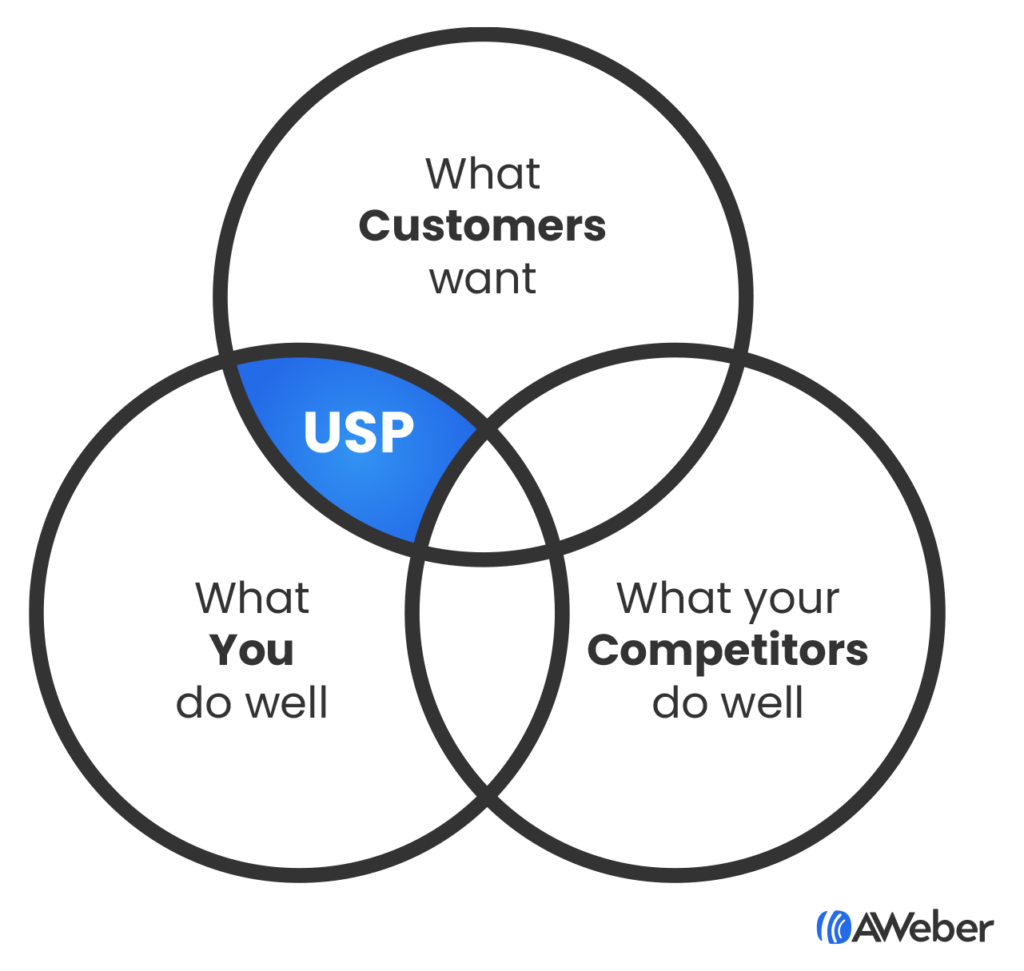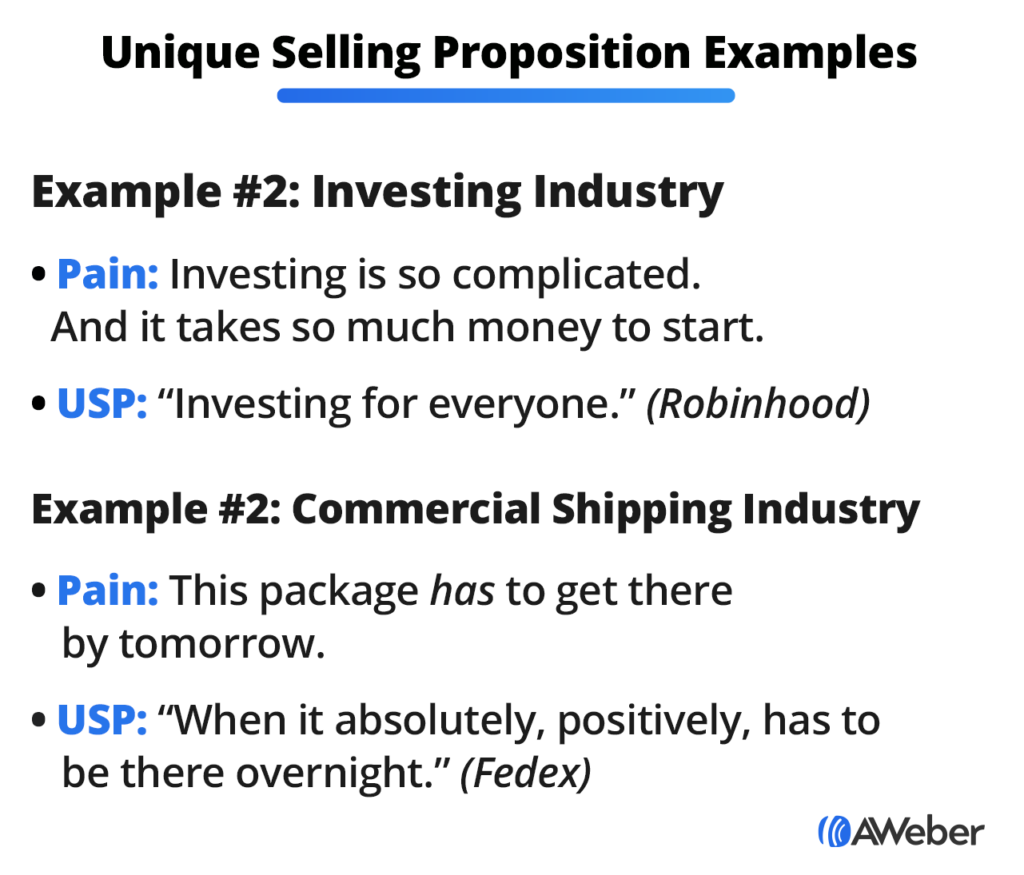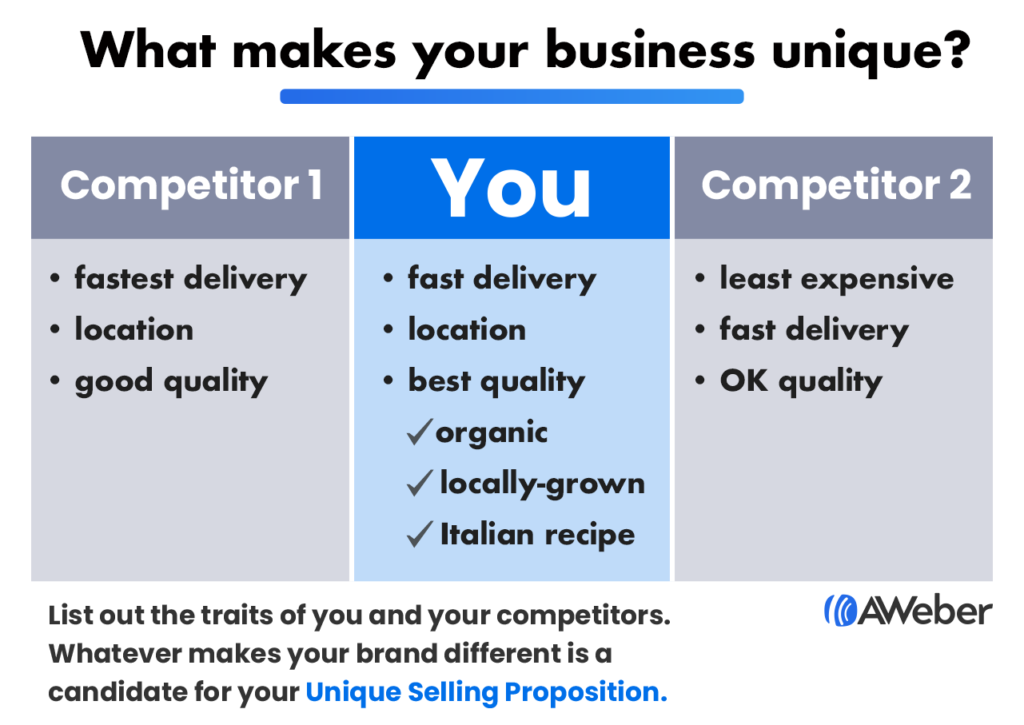
Developing a strong unique selling proposition is one of the best ways to get better results from your marketing. Getting your unique selling proposition right will also help you define your overall marketing strategy. It will make all your marketing efforts easier.
What is a unique selling proposition?
Basically, your unique selling proposition (USP) answers these two questions:
- What makes you better or different than your competition?
- Why should people buy from you?
Your unique selling proposition should be a short sentence or a phrase that sums up exactly why your business is better or different from your competition. It's what makes your business different.
Here are a few characteristics of strong USP:
- It is true to your business.
Unique selling propositions can't just be made up to sound good and then slapped all over your advertising. They need to come from what your business is genuinely and inherently good at.
It's not enough to just claim, "We're the best." This is especially true if you're in a business with a lot of competition, like a pizza place or a candle shop. But a USP can illustrate why you think you're the best. If you say, "All about the quality," that's potentially a USP... but only if your business is unusually focused and dedicated to quality - if it's "your thing."
Your company mission statement and your USP should be similar, but your mission statement is usually directed at how and why you run your business. A USP is about the essence of your company, like a mission statement, but it is crafted specifically as a message to your target customers.
- It sums up your promise to your customer.
Your unique selling proposition is as much about your potential customers as it is about your business. And a USP doesn't even have to be specifically about your product. It can be how you deliver the product. For instance, do you strive to offer world-class customer service? That's something that could be woven into a USP. A good USP explains your key benefit to customers.
Your unique selling proposition should also be written to attract your ideal customers. You don't need (or even want) to serve everyone. If your business and USP are well-defined, it will automatically speak to your ideal customers. So for a pizza place, "all about quality," would automatically attract foodies, not people looking for the cheapest pizza around, or the one that could be delivered the fastest.
- It articulates how your business is different from your direct competitors.
Unique selling propositions leverage the marketing principle of "positioning." They sum up how you position your company compared to other companies in the minds of your prospective customers. A good USP describes your key competitive advantage over your competitors.
- It is memorable.
It helps that USPs tend to be short, but your USP should be memorable for more reasons than just being short. Again - the point here is to distinguish yourself from your competitors, so being memorable is a key part of that.
You'll know you've found your USP when you say it out loud and think, "That's us. That's who we are." You want a statement that is both core to your company's identity and that is foundational enough to be reflected through all your marketing and your outward-facing communications.
You want to hit the sweet spot between your company's identity, how you're different from your competitors, and what will resonate with your ideal customers.
Here's a visual way to understand that sweet spot:

What a unique selling proposition isn't
A USP is not just an advertising slogan. It does not just make a sweeping claim that you're "the best." And it doesn't talk about your market share,or even your business model. It's written to make your company stand out in your customers' minds.
Standing out with a well-defined USP may mean you can't appeal to everyone. That's OK. Too often, businesses and entrepreneurs try to create something for everyone. The result is generic, trivial, and, well, boring. Sadly, when you try to position a company as being for everyone, it usually ends up being for no one in particular.
For example: A restaurant can’t have the best ice cream and the best ribs. A software company can’t be the best organizational tool for solopreneurs and large multinational corporations. A gym can’t have the best high-intensity interval classes and the best bodybuilding classes.
Sure, it can be scary to go left when everyone else is heading right, but the upside to going left is huge.
Or, as Dr. Seuss put it: “Why fit in when you were born to stand out?”

5 unique selling propositions examples
1 - Canva: Online design made easy

Canva is a great example of being completely true to its USP. They make designing stuff easy. And nearly every aspect of their customer experience conveys that "make it easy," approach.
Being the easiest thing to use or work with can be a good USP in any industry. Especially in industries known to be difficult to use, like investing (Robinhood makes it easy) or doing taxes.
2 - Buffer: All-you-need social media toolkit for small businesses

Buffer's unique selling proposition speaks to a pain point of its ideal customers: The pain of too many tools. So instead of having a "stack" of marketing tools, Buffers customers just use Buffer. Everything is all in one place. Also notice how Buffer says it's for a specific type of customer - small businesses. They aren't for big multinational companies. They've picked an audience and that's part of their USP.
3 - Product Hunt: The best new products in tech.

Product Hunt gets away with using the term "the best," but they aren't using it to refer to themselves. This is a platform of new SaaS tools, and Product Hunt's raison d'etre is to let people vote on the best new tools. The purpose of their platform is to surface the best new tools. Their purpose is distilled into that USP.
4 - REI: A Life Outdoors is a Life Well Lived | REI Co-op

REI is an outdoor goods retailer. Or at least they started out as one. Now, they offer trips, classes, and a vast library of articles about outdoor life. So their unique selling proposition has to be big enough to fit all that in. And it does. REI is all about helping people get outdoors.
5 - Peet's: The Original Craft Coffee

Peet's uses a claim - "the original craft coffee" that they can back up. There are hundreds (thousands?) of craft coffee companies now. But Peet's has been brewing for longer than any of them. That "we're the original" sentiment also resonates with their ideal customers, too.
How to write your own USP
Finding an effective unique selling proposition can be difficult, but if you put in a little thought and a little work, usually a good USP will become evident.
The challenge is, how many businesses and products are truly one-of-a-kind? There are thousands of life coaches, personal trainers, electricians, therapists, authors, yoga instructors, digital marketers, clothing retailers, and so on. What makes yours stand out?
Pro tip: Don’t be unique for the sake of being unique. Selling wool coats in a heatwave may be unique, but it won't sell coats. This is why your unique selling proposition has to tie into what people want. And specifically, the type of people who would be your ideal customers
To uncover your USP, answer these ten questions in as much detail as possible:
- What product or service are you selling? If you’re an affiliate, what businesses or products are you promoting?
- What features and benefits are unique about your product or service?
- Who is your target audience - your ideal customer?
- What are your ideal customers' key pain points?
- What problem do you solve that addresses those key pain points?
- Who are your competitors and what are their USPs?
- What does your product or service do especially well in comparison to your competitors?
- How do you run your business differently than your competitors?
- How do you treat your customers differently than your competitors?
- If a customer if they asked you directly, "Why should I buy from you?" or "Why should I work with you?" how would you answer?
Now that you've got those answers, sum them up in one brief statement: What makes you different?
That's your USP.
Once you’ve answered the ten questions, ask yourself: How does my product or service solve my target audience’s biggest problem? What is my competitive edge?
Then try to boil it down to a concise answer. (One to two sentences, maximum.)

Once you have your unique selling proposition, use it
Don't just leave your USP in your notebook. Put it everywhere so it stays top of mind. Make it your computer and cellphone background. Frame it on your desk. Sign it at the bottom of your emails.
Even more importantly, live it. Breathe it. Make everything you do and how you do everything embody that USP. Make it as much a focus of your daily work as your mission statement or your business's financial goals.
The post 5 Examples of a Unique Selling Proposition and How to Write Your Own appeared first on AWeber.
from AWeber https://ift.tt/GMA3j5g
via IFTTT
No comments:
Post a Comment